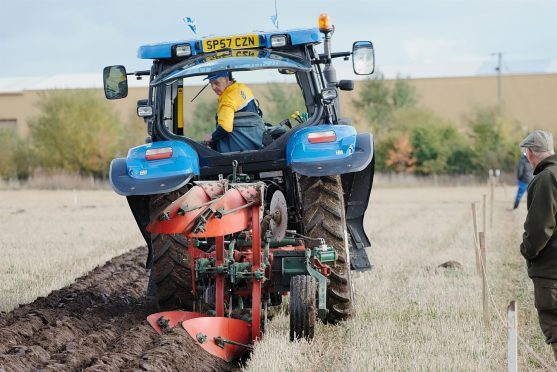Exactly 200 years after Scots inventor James Small began his pioneering work to develop the modern plough the Scottish Ploughing Championships held its first contest.
A modest field of 49 turned out at a muddy farm at Tibbermore in Perthshire.
There were only three classes at the 1963 event with the winner of each collecting what was then an impressive £20.
Fifty-five years on and the annual extravaganza is still awarding what might now be regarded as a somewhat frugal £30 top prize.
There has been no appetite for raising the stakes any higher – the ploughmen don’t do it for the money, it’s for the love of the craft.
A skill dating back millennia, it was revolutionised by Small’s application of mathematical calculations and science to the mouldboard shape, eventually producing the universal cast iron shape of the Scots Plough.
Today the 21st century celebration of ploughing proficiency is embodied in the matches that, across Britain and Ireland, attract hundreds of thousands of competitors and visitors throughout the season.
Gearing up for the Scottish Championships next weekend (October 28 and 29) is host Eck Cowie at Spreaderhill Farm, Crimond, near Fraserburgh, where more than 200 plots will be ploughed over the two days.
The 200 acres of arable had been carefully prepped and cared for after the barley was harvested and by the beginning of this month conditions were virtually perfect – a state that the Cowie family, who also farm at nearby Bilbo, was hoping would prevail for the big weekend.
“It’s an honour to have the championships here and very important to promote ploughing contests because the youngster who wants to start farming or ploughing can come and look and see what’s happening,” said Eck.
“And it’s not only ploughing, there are trade stands providing a window for everybody to show their wares.”
A crowd of well over 1,000 is expected at the contest which is an important social event for farmers, competitors and spectators and a significant economic boost for the host area which generally sees hotels and guesthouses fully booked within a 15-20-mile radius.
Originally a one-day event, it spread over two days from 1990.
This year it kicks off with a blessing of the plough service in Crimond Parish Church on the Friday evening before the competing starts the following morning.
Advance entries were running at more than 160 with competitors coming from as far away as Caithness and Orkney and Beamish in County Durham.
As usual the vintage classes and horse ploughing are popular but this year the non-hydraulic reversible classes have shot up from a low of eight in previous years to 17.
Down the decades enthusiasm for the championships has ebbed and flowed but the past 20 years have been dominated by the Mitchells of Forfar, the father and son double Andrew senior and junior.
Their remarkable achievements have seen Andrew senior win the world reversible ploughing champion title six times and his son Andrew take the world conventional three times.
One thing that has not changed over the years is the general absence of female entrants.
The first Scottish championship did attract one young woman aiming for the Young Farmers’ Club title and it might have been expected that over the decades the number of female farmers taking on the ploughmen would have risen steadily.
After all, the landgirls of World War II did a sterling job: in the 1940s Betty Lowe of Perthshire’s Moneydie took two firsts and a second at the Tannadice and Oathlaw ploughing match. A few weeks later she came runner-up for the best all-round performance in a field of 43 tractors.
But the current contest remains very much male territory, a situation that continued to perplex Scottish Ploughing Championships secretary Jane McDowall.
She said: “There was a lady who ploughed a few years ago but we just don’t have any now. We’ve no idea why. It’s very male-dominated but things might well change.”
One man who was there in 1963 and is still involved now is Leslie Dick of South Doll Farm, Falkirk. He won Class 3 back then and is a judge for this year’s Class 1 Conventional, world style.
Like the Mitchells, his son Jamie, of Drum of Kinnaird Farm, also Falkirk, is continuing the tradition and taking part this year in the Class 3, reversible, butts.
Jamie has been competing for 30 years – a skill, and the love of which, that seems to be in his DNA.
He said: “It must be a bug I possibly got from my dad. His brother ploughed and my grandfather also ploughed so it’s been a family trait.
“I just really enjoy the competing and the art of ploughing. There are quite a lot of different aspects to it and you meet a lot of like-minded people.”
Backed by main sponsor agricultural machinery and service provider Kverneland, plus others including Ravenhill agriculture, construction and groundcare machinery specialist, the Scottish Ploughing Championships is an event that not only provides a chance for the ploughers to prove their prowess but is a valuable opportunity for the Scots farming community to reinforce its place in the development of a skill that is ubiquitous worldwide.
